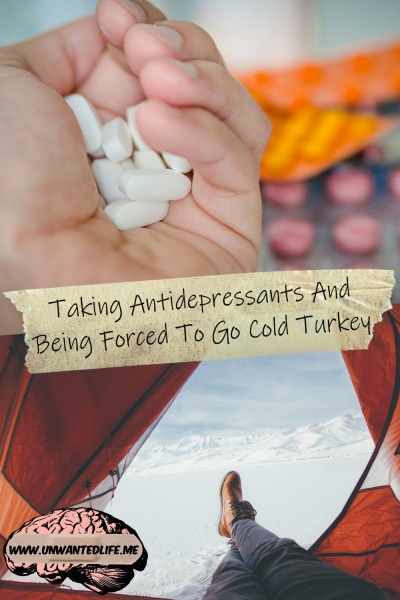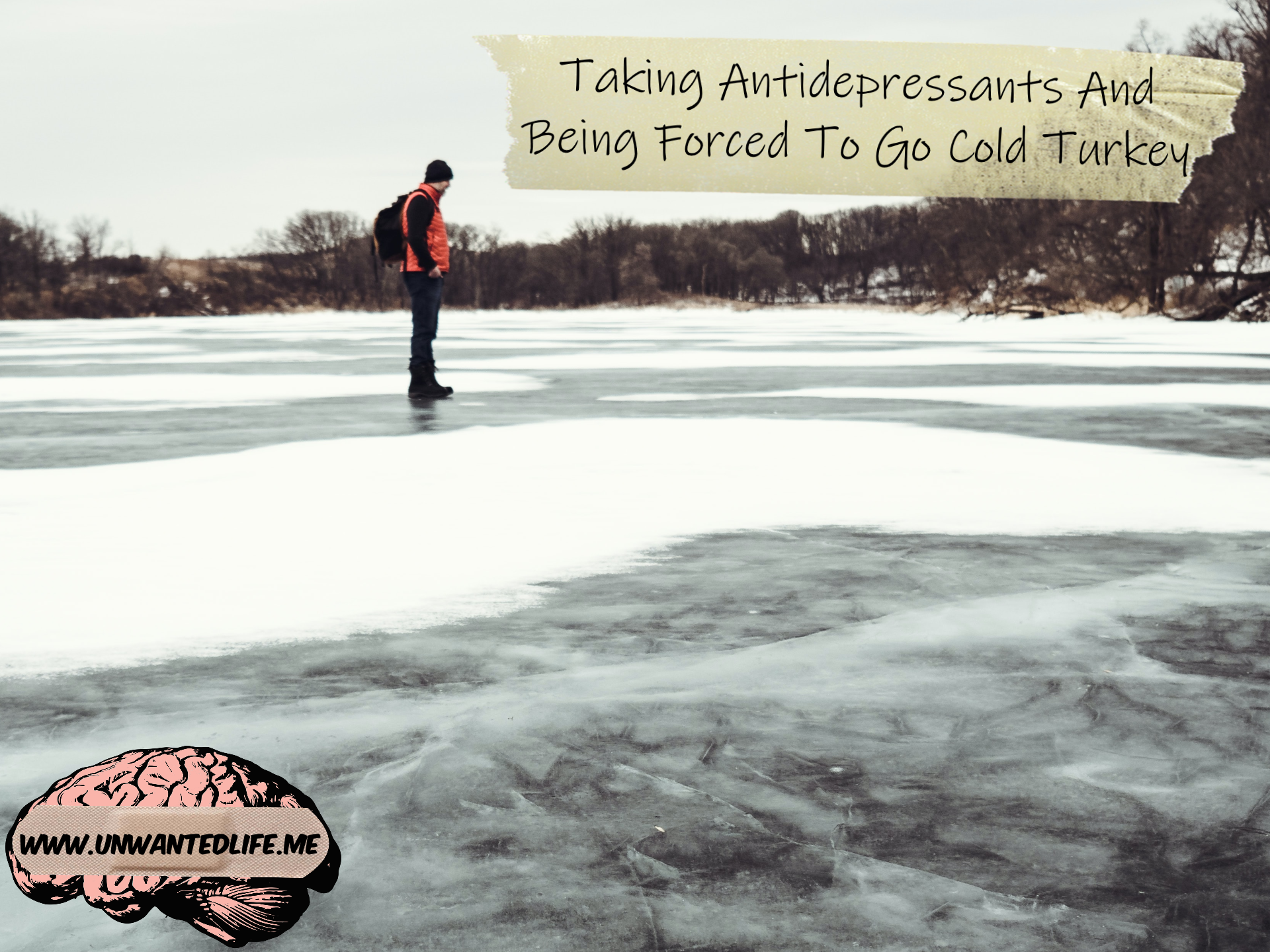If you read my previous article, then you’ll already be aware of the problems I had with seeking professional help. Antidepressants and I just didn’t mix well, due to them all causing me to have psychotic episodes. Eventually, we did find a combination of medications that didn’t trigger a psychotic episode.
What Does Going Cold Turkey Mean?
Cold turkey is more often used to describe someone who’s decided to quit something, like eating chocolate, smoking tobacco, or taking illegal drugs. But it can also be used for stopping medication as well. So what is going cold turkey? Going cold turkey is the process of stopping without a staggered withdrawal plan, instead choosing to instantly go abstinent.

My Antidepressant Cold Turkey Experience
As I stated in my previous article, I was on a combination of medications for my depression that didn’t instantly cause me to have a psychotic episode just by simply taking the medication. However, it wasn’t to remain problem-free. I was about to have my first detrimental run-in with my new Mental Health Trust.
Let me set the scene a little. I moved to London to attend university, which meant a new GP and a new Mental Health Trust to deal with. For some reason, I was never given a repeat prescription for my sleeping tablets or for my antidepressants, nor was I ever offered therapy so I could work on my problems. I went from the care of people who had realised the full complexity of my problems to the care of a Mental Health Trust that didn’t give a dam at all.
“I went from the care of people that had realised the full complexity of my problems, to the care of a Trust that didn’t give a dam at all”
Although I was on a combination of medications that was allowing me to sleep and didn’t automatically cause a psychotic episode, my anxiety was still causing me problems: I was still having hallucinations triggered by my anxiety attacks. Nevertheless, I decided to go to university (you might be familiar with this if you’d read my previous article – How Being Diagnosed with Dyslexia Changed My Life) even though I was still having a very hard time coping with my anxiety disorders and psychotic episodes.
Due to my medications not being on repeat prescription, I was having a lot of problems getting my prescriptions issued. This meant I had to keep making appointments to see a GP. However, due to fluctuating appointment waiting times of between two to three weeks, I was always running out of my medications before I could see my GP to get my replacement prescriptions.
This often resulted in me going days without my medication, which would cause a psychotic episode that would last until I was back on them.
On two occasions, I had to go to the hospital to get an emergency prescription. The second time I did this, however, was when the gates of hell would open up for me. The person I saw refused to issue both my prescriptions. They wouldn’t issue my sleeping tablet, only my antidepressants.
“On two occasions I had to go to the hospital to get an emergency prescription”
I explained the situation around my homeostasis problem, how my antidepressants on their own cause me to have a psychotic episode, and even though there was a letter in my medical record stating I have to have the sleeping tablets to be able to take the antidepressants, they still refused to issue the prescription for them.
So instead, I asked if I could be given enough sleeping tablets to wean myself off the antidepressants. A pretty common-sense reduction plan so I could then stop taking both of them. But they refused. I was now stuck with the choice of withdrawing from the medication (not knowing it was going to cause me to have a four-month-long psychotic episode) or taking my antidepressants on their own, which would cause me to have a psychotic episode every day I took them. I’d also have to deal with not being able to sleep again.
“I just wanted enough sleeping tablets to get the anti-depressants out of my system”
I just wanted enough sleeping tablets to get the antidepressants out of my system, allowing my body to adjust to no longer having them. Is that so much to ask for as a compromise? I never wanted to take the mood stabilisers in the first place, because they didn’t do anything to help me. But no, they wouldn’t even do that.
Thus, I told them I’d just go cold turkey then, and they said fine, so I left. I can not state this enough. Never go cold turkey off of any mental health medication, especially when you’ve been taking them for a long time. It. Will. Fuck. You. Up.
Without my sleeping tablets, I went back to being an insomniac. I also started to pee in a pint glass because I was too embarrassed to be going toilet half a dozen times an hour, throughout the night, day after day. My fear of wetting myself that fuelled my anxiety and my insomnia had returned at a magnitude I hadn’t had since the early days of my anxiety disorders.
Because I feared waking everyone up by going to the toilet so frequently, I was once again consumed with trying to empty every drop of liquid from my bladder. Thus, the pint glass, in order to appease my anxiety disorders so I could sleep. I’d very much fallen back to pre-seeking help from professionals (Drug-Induced Psychosis And My Anxiety Disorders).
“It was a disgusting nightmare of isolation and avoidance”
It was a disgusting nightmare of isolation and avoidance. I couldn’t be around anyone at all. I couldn’t bring any attention to myself at all. And there was nothing I could do to stop it. At all.
Ever since the three-day drug binge I mentioned in my previous article where my anxiety disorders were born, all manner of substances will trigger a psychotic episode, including prescribed medication. Even anti-psychotics and antidepressants would cause visual, olfactory, tactile, wetness perception, and auditory hallucinations, as well as causing me to question my sense of reality.
But that wasn’t the worst part, not by a long shot. I was so consumed by my anxiety disorders that I barely left the room I was renting. I didn’t attend any of my university classes and only went to the university to submit my coursework (because they required a physical copy to be submitted for some reason). I missed around four months of university because I was paralysed by fear and bombarded by never-ending hallucinations for the full four months.
Even drinking alcohol wasn’t an effective last line of defence for controlling my psychotic episodes anymore. This was because my four months-long psychotic episodes required me to be extremely drunk just to cope. A level of drinking that would cause me to suffer alcohol poisoning, especially if I drank that much every day for four months.
Normally, one or two beers are enough for me to avoid having a psychotic episode if the worst comes to the worst. But for these four months, nothing was effective. My life was a living hell of isolation, hallucinations, no sleep, and barely any food.
“My life was a living hell of isolation, hallucinations, no sleep, and barely any food”
Once these four months were over, things started to settle down. I was able to attend my university again, although I often had to use alcohol to avoid having a full-on psychotic episode. My not-so-healthy last resort coping strategy started working again: it was back to its one to two pints of larger effectiveness again.
A withdrawal strategy for my medications would have avoided all the problems going cold turkey had caused me. But the person I met to get an emergency prescription from the Mental Health Trust just wasn’t interested in that idea. I could have been kicked out of university because of what happened as a result.
I’d repeatedly brought up what happened at this encounter with my Mental Health Trust over the years. But they kept telling me that it happened too long ago to be investigated. However, 10 years after it happened, I found out that they hadn’t even logged my second attempt to get an emergency prescription on my medical records.
This was likely because making someone go cold turkey from sleeping tablets and antidepressants at the same time is ridiculously dangerous, and goes against the NICE guidelines. I was so angry when I found that out because it was far too late to do anything about it.
But you don’t need NICE guidelines to know you shouldn’t do what they did. Anyone prescribing them should know the risks going cold turkey would cause. The person who did that to me should have been one of those people. Everyone prescribing such drugs, and the inserts that go with them, even back then, would tell you not to just stop using them.
I was left with a no-win situation, where all options led down a path of a continuous psychotic episode. It was an incredibly horrible thing to do to me, and it was a horrific experience to have to live through ( especially with my history of suicidal behaviour and self-harming).
I hope to god I never have to go through that again.
That experience put me off ever trying medication for my mental health again, as I don’t like being at the mercy of anyone who can cut me off from them at any time. This is a bad legacy to be left with.

Antidepressants And The NICE Guidelines
In case you’re interested, I found the NICE guidelines that should have been implemented by my Mental Health Trust:
1.9.2 Stopping or reducing antidepressants
1.9.2.1 Advise people with depression who are taking antidepressants that discontinuation symptoms may occur on stopping, missing doses or, occasionally, on reducing the dose of the drug. Explain that symptoms are usually mild and self-limiting over about 1 week, but can be severe, particularly if the drug is stopped abruptly.
1.9.2.2 When stopping an antidepressant, gradually reduce the dose, normally over a 4-week period, although some people may require longer periods, particularly with drugs with a shorter half-life (such as paroxetine and venlafaxine). This is not required with fluoxetine because of its long half-life.
NICE (2009)
One of the other short half-life drugs you’ll need to gradually reduce the dose of over a longer period than four weeks is the medication I was taking, citalopram (WebMD).
Withdrawal Symptoms From Stopping Antidepressants
These are some of the withdrawal symptoms you might experience:
- Restlessness.
- Issues around sleeping.
- Stomach and digestive problems.
- Unsteadiness.
- Sweating.
- Headache.
- Muscle spasms.
- Experiencing an electric shock in your head.
- Feeling irritable.
- Feeling anxious or confused.
- Flu-like symptoms.
- Fatigue.
- Nausea.
- Nightmares.
- Tremors.
- Vomiting.
According to the NHS, such withdrawal symptoms start around five days after you’ve stopped taking your antidepressant and lasting around six weeks. However, it is possible to have more extreme withdrawal symptoms, and if you do, please speak to a doctor as soon as possible to discuss options. Don’t end up in the same hell I did.
How To Avoid Withdrawing
Going cold turkey off of your antidepressants or any medication used for managing mental health conditions doesn’t give your brain time to adjust to the absence of the medication (WebMD). That’s because you’ve been artificially changing the mood-regulating substances in your brain. As such, your body may produce less of substances naturally. Thus, when you go cold turkey, your brain isn’t prepared to create all the mood-regulating substances itself.
The number one way to avoid withdrawing like this is to talk to your GP, psychiatrist, or prescribing doctor and create a reduction plan. This is a basic harm reduction method. It’s a method I came across while studying addiction as a way to help people come off of substances they’ve become dependent on, but it’s just as applicable here. The point is to come off the substance with the least negative effects possible to make the transition as easy as possible. This is the only method I’d recommend to you so you can come off your antidepressant or other mental health medication safely.
As always, leave your feedback in the comments section below. Also, feel free to share your experiences of taking antidepressants, medication, and going cold turkey in the comments section below as well. If you want to stay up-to-date with my blog, then sign up for my newsletter below. Alternatively, get push notifications for new articles by clicking the red bell icon in the bottom right corner.
Lastly, if you’d like to support my blog, then you can make a donation of any size below as well. Until next time, Unwanted Life readers.
References
NICE. (2009). Depression in adults: recognition and management. Clinical guideline, [CG90]. Retrieved from https://www.nice.org.uk/guidance/cg90.


I am so sorry you had to go through this. I am on anti depressants from long and know how even missing a single dose could cause symptoms let alone going cold turkey. You should report that person. You didn’t deserve this. I hate how some docs can be so ignorant .
medication can be a double-edged sword when you’re too disorganised to keep track of your medication
Thanks for sharing your story as this is important. I have BP medicine and the problems I have had with my scripts.
What’s BP stand for and what problems did you have with your script?
I actually didn’t know this about taking anti-depressants, so this is really interesting insight to make sure people understand the good and the bad- and how to avoid going cold turkey. Thanks for sharing 🙂
Thanks for commenting
Thanks for sharing yoru story. I’m a mental healthcare provder, and though I am not a prescriber part of my job is educating clients about risks regarding starting and stopping medications. This serves as a great reminder for continued diligence and thorough research. I appreciate your openness, and i hope you find some alternative methods of managing your mental health that don’t leave you dependent on people who have violated your trust and safety so wantonly.
That’s great that you’re making sure people are aware of how to start and stop taking medication. Too many people aren’t aware of the risks of just stopping
I recently went cold turkey on my anxiety meds and suffered from a major attack. It was the doctors idea for me to ween myself off but I regret it sometimes. Thank you for sharing your story.
Your doctor suggested weening yourself off but you decided to go cold turkey instead? It’s a pretty common mistake, people just don’t realise that your body needs time to adjust with certain medications
Thank you for sharing your story and creating awareness. I truly wasn’t aware of these issues and I’m sorry you went through this.
Olivia | https://www.oliviaandbeauty.com
Thanks for commenting
I am sorry you had to go through this. What an awful experience, all because doctors couldn’t communicate. I’ve had a few days where I missed tablets due to them issung the incorrect prescription & I’ve really felt it!
It can be such a nightmare when issues with your prescription arrise. I think I’ll start hoarding a back up supply to avoid some of these issues again
Gosh, this sounds so awful. I’m sorry you had to go through this. I’ve been on antidepressants, (SSRI’s) for 20 years. You are supposed to wean off of them, or you have horrific side effects just like you said. It sounds like you didn’t have good care. I work in healthcare when I see things like this it infuriates me. I’m just a caregiver so I cant do much about it. I’m so sorry.
~Michelle
I really hate my mental health trust, they kept doing stuff like this. They’re not fit to be looking after people who need support